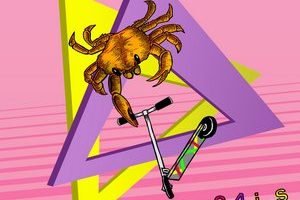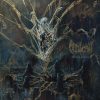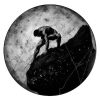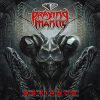Troldhaugen – Humor Evolved
Tuesday, 19th September 2017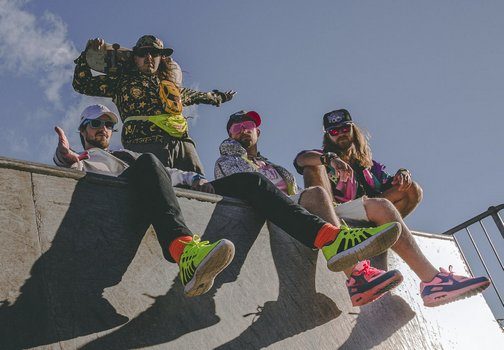
If one turns back the pages on Troldhaugen and look to their early roots and then fast-forward to present day, there’s some significant changes to the band’s sound. From their folk metal beginnings, Troldhaugen has grown and morphed into a much more unique entity. Along with their shift in musical inspiration, one thing has become a focal point, humor. Humor is something some of the metal listenership doesn’t take too well on occasion, but went done well it can add a unique spin to any band’s material. Troldhaugen have no problem with crafting just the right type of humor.
Humor runs rampant thoroughout their latest album, Idio+syncrasies, but it’s not just a running gag. You’ll be treated to a wild number of sharp turns, as they shift genre and turn convention on its head. All done with plenty of musical proficiency – a key ingredient in keeping the band afloat (as well as being lumped into the joke band category). Vocalist Jariss Shead talked to us over Skype just after the album’s release to further discuss the band’s evolution, humor, songwriting, and successful crowdfunding campaigns.
Dead Rhetoric: The album [Idio+syncrasies] is very unique; ‘very fun’ is one way of looking at it…
Jariss Shead: I think that’s what we are all about these days. We are pretty silly dudes, so I think our personality, on this album, is really showing though.
Dead Rhetoric: The band has been evolving with each new release – where does Idio+syncrasies place the band?
Shead: When we started, it was a down-the-line folk metal [sound], at least trying to emulate what we were listening to at the time. The guitarist, Matt [Bell], and myself were listening to a lot of bands like Finntroll, Lumsk, and Otyg. We were trying to get that sort of sound because we just liked the music. But it’s become less about sounding like something else, and more about doing what we like. The interests from the crowds and ourselves have gravitated towards the more wacky aspects of the music. Finntroll have a bit of that tongue and cheek aspect, like cartoon sounds and whatnot and we found that going down that path was really attractive to us so we kept heading in that direction. We kept trying to push the envelope.
With the last album, Obzkure Anekdotez for Maniakal Massez, we really crossed over from being just metal and headed into the more experimental and strange. For the new album [Idio+syncrasies], we haven’t even thought about [the sound]. Metal wasn’t really a huge driving force behind the album. It’s still metal, but we’ve just gone balls to the wall with the craziness.
Dead Rhetoric: Given the shifting in sound, do you still consider yourselves in the ‘folk metal’ category? Or have you veered off totally in your own direction?
Shead: If you are a [folk metal] fan, I’m not sure you’d be too happy [laughs]. We had a lot of tags put on us over the years, different styles that we’ve dabbled in…I guess folk metal is where we [were more known in], but I think it’s a bit of an insult to folk metal bands that are trying to do that genre when we do things like a dubstep drop or some rap beats. I think that tag could be dropped, but it’s up to people to label it what they want. We don’t have a label for it. It’s pretty difficult for us to tell our friends about what sort of music we play because it’s changed so drastically in the last few years that I’m not sure what to call it [laughs].
Dead Rhetoric: With your off-kilter approach – what’s the songwriting process look like?
Shead: The main process that happens is that our guitarist will come up with either a riff or an idea, or even a full song structure. This guy can pump out music like a factory. It’s always pouring out of him. The amount of content is just vast. He’ll just kind of keep throwing it out there until something sticks. It’ll go through the different refining process by getting sent to us first. He’ll send it to us, see what we think, and if we have any ideas to add/change we do that. We might get together a few times to add layers, or change a structure, or something like that. Once that’s done, the way it has worked in the past is that we’ll start recording some vocal demos – sometimes it might be just an abstract idea or concept.
With this album, it was a little different…we have gotten to the point where we are pretty close as dudes, and the time that we spend with each other, we are laughing at each other’s jokes a lot. Eventually if something comes up that goes around the floor with laughter, it can become either a concept for a song, or a platform for a song to start being written. Now it’s literally what we think is entertaining or funny, and then the lyrics get written as a cherry on top of that thing. The lyrics usually come together very quickly – I’m quite a procrastinator as it is. I like to spend as much time compiling as I can, but that’s all it is – joking and getting together is all part of the process for me.
Dead Rhetoric: So with all the changes that the band has been through, do you feel that you’ve found the specific sound that you are going for?
Shead: Yes, but I guess that’s only for the time that it’s being written. It’s what it’s going to be for now – we aren’t going to do that [sound] again next album. I think that’s a given these days. It might be inspired or in the next direction on from that, but I think at this point, we like too many different styles to pigeonhole ourselves. I don’t think we want to be locked into anything. We like the dynamics – we are always listening to new stuff and being influenced by new things. I think it’s more about the change. We always want to be changing it up and keeping people on their toes. If there was anything that people could expect from us, it would be to expect the unexpected and that would always be the case.
Dead Rhetoric: Yeah, it seems like after a few albums and changes that people would expect that your sound is going to be constantly influenced by what you are into at the time…
Shead: I can’t imagine how painful that must be for some people! It’s not like we consciously worry about that, but we think about it and we do talk about it.
Dead Rhetoric: Can you talk about the Crumbs EP that was also released as well?
Shead: [Laughs] I don’t know if I can! We brought it up the other day – we don’t even remember why it happened or the reason for even doing it in the first place. The quality is quite low. It’s really raw. The instrumentation is literally Matt finding the worst patches he could on Q Bass, making a midi track that goes for about a minute, and then we just laid vocals down. I don’t even know why we did it. We are as confused as all the fans are. We had an album launch show [last] Friday – a week before the gig we decided we were going to add it as a set. It was a really bizarre performance. At the moment we are getting it printed and sent out for the Pozible [crowdfund] rewards. I’m working on the back cover as we speak and the whole thing is a bit of an anomaly.
Dead Rhetoric: The album [Idio+syncrasies] artwork is very brightly colored. Were you going for something that was going to be immediately contrasting to other releases?
Shead: For sure. I think last album we went for the overload of information. The cover included a bunch of characters from the songs we had and it really worked for that release. As part of the departure for the style, but also in refining and getting the presentation a bit more slick, we wanted to do something that was even more streamlined and simplified while keeping that insane edge and make it more about a focal point for the album…rather than have a bunch of things to look at – something you don’t understand. You look at it and don’t really get it. I think that’s kind of mirrored with style of the music on the album as well.
Dead Rhetoric: You crowdfunding for this album as well, and it seemed quite successful (meeting your goal in 14 hours). It wasn’t your first one, but were you completely stunned with the way it worked out?
Shead: Absolutely. It’s hard to even take it on board sometimes, with what it actually means with crowdfunding. The way that we are all able to operate on this album is literally because of each fan that believes so much in what we do. It really is overwhelming to really have that many people that believe in you and want to see you do your next thing. We all love doing it and we are having a great time; the fact that people want to give up their time and money to be involved with that and help with the process is pretty intimidating, but it’s also so humbling, so amazing, and really feels like we are connected to the people.
As you said, we did two crowdfunding campaigns, and you see these familiar names pop up that have kept up through the years and have pledged again, and you see the interactions on Facebook – we are all doing it on the cuff, on the seat of our pants, and all DIY. I think it really adds to it, and it feels like a community and that people are in this Troldhaugen world with us and having a great time. The fact that people want to donate and pledge towards it is really cool. We don’t expect it at all. We had a goal for our last crowdfund of AU $3000 and we got AU $6000, for this album we set it at AU $5000 and we got AU $10000. We were worried that $5000 was going to be too high, it was crazy and awesome.
Dead Rhetoric: Looking at some of those rewards, how did you come up with some of them? A few are downright hysterical.
Shead: [Laughs] That took a little while. We wanted to offer something that you aren’t going to get normally. We are in a unique position to do some of the stuff that was on the campaign. We did the calendar thing as kind of a joke, but people bought it so we actually have to do it. There was one where you could buy a hair…unfortunately no one bought that. I don’t know why [laughs]. I have a café and we are going to do a dinner party kind of thing with a few pledges. We have some cool stuff and people latched onto the silly/hilarious vibe but also got something cool in return.
Dead Rhetoric: It might be obvious, but how much of a role does humor play into the overall concept of the band?
Shead: The percentage these days is growing exponentially. I would say that it’s the main, driving force. If we are laughing, it’s pretty much guaranteed to be something we are going to use. We are all fans of comedy; we listen to music that has humor in it. We are all fans of Frank Zappa and his take on humor in music, he has done masterfully. We’ve talked about it before, where if you have humor it can’t just be dumb or crass. It needs to be planned. You can read beyond the kind of face value jokes of silly lyrics; you can find that there’s a thought-out process behind every nuance or joke that we have been doing. But at the same time, if you expect that too much, we are going to throw in a joke that is at face value – just dumb and stupid, just to mix it up again.
I guess Crumbs is really that outlet as well. The Crumbs EP…I don’t know how you could possibly take it at anything other than face value [laughs]. With Idio+syncrasies, all the musical jokes…either a style change or a musical exclamation point, they are planned out. It’s a very conscious effort to make sure things are funny or exhilarating.
Dead Rhetoric: That brings up the fine line – you are working so hard to put the humor in there, but is it hard for some people to take the music seriously? Even though it’s obvious and clear that everyone is very good at writing music that is unique and stands up on its own.
Shead: Again, it’s something that we’ve thought about…we really want to challenge people these days. If you have never heard us before, and it comes up a lot with reviewers. They are just being given the album with no pretense about who we are or what it is all about. They just have to sort of deal with it. We’ve been seeing a couple of reviews, especially for this album, where [they don’t get it]. There’s been people that have been along for the entire ride, so they kind of get what we are doing. But if you’ve never gotten into it and you are faced with this, I guess it would be difficult to even fathom what you are listening to and listen beyond it. It’s going to take a couple of listens to even be able to get all the information that’s on there. But we want that. We want to keep people on the seat of their pants and have them wonder how far we are going to take this. Like, “Do I need to keep my mind switched on or is this just a silly ride that I’m on?”
Dead Rhetoric: What’s the toughest part of trying to reach further into the world and grow the band when you are based in Australia?
Shead: Aside from the geographical size and distance between seas in Australia, we’ve actually had a pretty good run in terms of exposure overseas. We made some splashes with different camps around the globe. We have fans from the start that were in areas that we were aiming at – more Scandinavian-inspired folk metal at the beginning and a few fans latched on from that area and are still sticking around. From there, they tell their friends and we’ve toured with other bands and people there for the headliner will tell their friends. A lot of that happened with Alestorm – it’s really been snowballing from there. I wouldn’t say it’s limiting – the way that you get music out nowadays is that everybody uses the ‘Net and it’s a great tool. We are at this point now that we have done a bunch of road gigs.
When we started out, we were traveling up and down the coast here and playing out west. There was a lot of driving involved, but at this point we don’t really want to be doing that. We want to do gigs that are more meaningful to us, rather than just trying to get exposure. We are able to be pretty selective, and we want to be selective about what we do. That kind of approach has worked for us lately. We focus on the big shows and really keeping it a tighter package instead of oversaturating the market. With the music, I think it has more of an impact that way as well. The performances have more of an impact…we leave people wanting more.
Dead Rhetoric: You’ve got the European tour with Alestorm coming up…any other plans for the remainder of the year, or into 2018?
Shead: At the moment we are focusing on smashing out all the Pozible rewards. We have to get a few of those out – some of those include writing some new music and covering some songs for pledges. That will be what we focus on when we get back from Europe. Other than that, we definitely want to do a large tour – capital cities around Australia. We have a tour lined up for the very first part of next year, it’s not locked in, but we have a good headliner coming in from overseas and we are going to do the national support for them.











